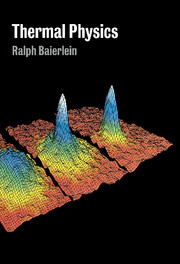Book contents
- Frontmatter
- Contents
- Preface
- 1 Background
- 2 The Second Law of Thermodynamics
- 3 Entropy and Efficiency
- 4 Entropy in Quantum Theory
- 5 The Canonical Probability Distribution
- 6 Photons and Phonons
- 7 The Chemical Potential
- 8 The Quantum Ideal Gas
- 9 Fermions and Bosons at Low Temperature
- 10 The Free Energies
- 11 Chemical Equilibrium
- 12 Phase Equilibrium
- 13 The Classical Limit
- 14 Approaching Zero
- 15 Transport Processes
- 16 Critical Phenomena
- Epilogue
- Appendix A Physical and Mathematical Data
- Appendix B Examples of Estimating Occupation Numbers
- Appendix C The Framework of Probability Theory
- Appendix D Qualitative Perspectives on the van der Waals Equation
- Index
3 - Entropy and Efficiency
Published online by Cambridge University Press: 05 June 2012
- Frontmatter
- Contents
- Preface
- 1 Background
- 2 The Second Law of Thermodynamics
- 3 Entropy and Efficiency
- 4 Entropy in Quantum Theory
- 5 The Canonical Probability Distribution
- 6 Photons and Phonons
- 7 The Chemical Potential
- 8 The Quantum Ideal Gas
- 9 Fermions and Bosons at Low Temperature
- 10 The Free Energies
- 11 Chemical Equilibrium
- 12 Phase Equilibrium
- 13 The Classical Limit
- 14 Approaching Zero
- 15 Transport Processes
- 16 Critical Phenomena
- Epilogue
- Appendix A Physical and Mathematical Data
- Appendix B Examples of Estimating Occupation Numbers
- Appendix C The Framework of Probability Theory
- Appendix D Qualitative Perspectives on the van der Waals Equation
- Index
Summary
The chapter begins with a classic topic: the efficiency of heat engines. The topic remains relevant today—for environmental reasons, among others—and it also provides the foundation for William Thomson's definition of absolute temperature, an item discussed later (in chapter 4). Next, the chapter develops a method for computing the entropy change when a process occurs rapidly. An extended example—the Otto cycle—and a discussion of “reversibility” conclude the chapter.
The most important thermodynamic cycle: the Carnot cycle
Engineers and environmentalists are interested in cyclic processes, because one can do them again and again. Figure 3.1 shows the essence of the cycle for water and steam in a typical power plant that generates electricity. A simpler cycle, however, is more instructive theoretically, and so let us consider the cycle shown in figure 3.2, performed slowly throughout. We may take the substance to be some real gas, such as nitrogen (as distinguished from an ideal gas). There are four stages, characterized as follows.
Stage 1 to 2: isothermal expansion. From state 1 to state 2, the gas is allowed to expand while being maintained at constant, high temperature Thot. The pressure drops because the volume increases. [The ideal gas law, P = (N/V)kT, valid for a dilute gas, suggests such a pressure drop—qualitatively—for a real, not-necessarily-dilute gas, too.] The gas does work as it expands and would drop in temperature if energy were not supplied by heating.
- Type
- Chapter
- Information
- Thermal Physics , pp. 51 - 74Publisher: Cambridge University PressPrint publication year: 1999



